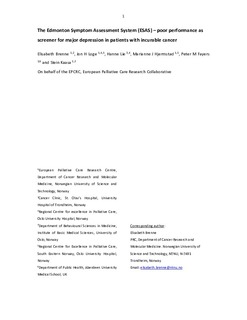The Edmonton Symptom Assessment System: Poor performance as a screener for major depression in patients with incurable cancer
Brenne, Elisabeth; Loge, Jon Håvard; Lie, Hanne Cathrine; Hjermstad, Marianne Jensen; Fayers, Peter; Kaasa, Stein
Journal article, Peer reviewed
Accepted version
Permanent lenke
http://hdl.handle.net/11250/2467217Utgivelsesdato
2016Metadata
Vis full innførselSamlinger
Originalversjon
Palliative Medicine : A Multiprofessional Journal. 2016, 30 (6), 587-598. 10.1177/0269216315620082Sammendrag
Background: Depressive symptoms are prevalent in patients with advanced cancer, sometimes of a severity that fulfil the criteria for a major depressive episode.
Aim: The aim of this study was to investigate how the item on depression in the Edmonton Symptom Assessment System with a 0–10 Numerical Rating Scale performed as a screener for major depressive episode. A possible improved performance by adding the Edmonton Symptom Assessment System-Anxiety item was also examined.
Design: An international cross-sectional study including patients with incurable cancer was conducted. The Edmonton Symptom Assessment System score was compared against major depressive episode as assessed by the Patient Health Questionnaire-9. Screening performance was examined by sensitivity, specificity and the kappa coefficient.
Setting: Patients with incurable cancer (n = 969), median age 63 years and from eight nationalities provided report. Median Karnofsky Performance Status was 70. Median survival was 229 days (205–255 days).
Results: Patient Health Questionnaire-9 major depressive episode was present in 133 of 969 patients (13.7%). Edmonton Symptom Assessment System-Depression screening ability for Patient Health Questionnaire-9 major depressive episode was limited. Area under the receiver operating characteristic curve was 0.71 (0.66–0.76). Valid detection or exclusion of Patient Health Questionnaire-9 major depressive episode could not be concluded at any Edmonton Symptom Assessment System-Depression cut-off; by the cut-off Numerical Rating Scale ⩾ 2, sensitivity was 0.69 and specificity was 0.60. By the cut-off Numerical Rating Scale ⩾ 4, sensitivity was 0.51 and specificity was 0.82. Combined mean ratings by Edmonton Symptom Assessment System-Depression and Edmonton Symptom Assessment System-Anxiety revealed similar limited screening ability.
Conclusion: The depression and anxiety items of the Edmonton Symptom Assessment System, a frequently used assessment tool in palliative care settings, seem to measure a construct other than major depressive episode as assessed by the Patient Health Questionnaire-9 instrument.
